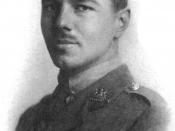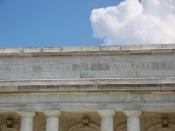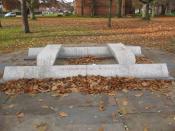Formal Writing
Have we learned our lesson?
"War demands the sacrifice of the people. It gives only suffering in return." The author of 'Why War 1916' Frederic Clemson Howe reveals the underlying truths behind war and the heroic facade created by war enthusiasts. This quote truly represents the thoughts of people at the centre of war and those affected by war. It suggests that people do not want war. The main themes are that war is caused by external factors from the people. The powerful, the greedy and the selfish people want war to further their position in society at the expense of all others. War is a contagion; it spreads rapidly from one person to another. The war activists promote war without considering the actual effects of war. Howe was a strong activist against war and was inspired to write books to warn the future youth.
The poem 'Dulce et Decorum Est' by Wilfred Owen is a shocking and thought provoking poem which details the experiences of soldiers in the trenches during World War I.
Owen himself experienced the horrors of war, which he vividly recounted in his poems and his letters. Owen uses graphic descriptions of life in the trenches to convey a powerful message to the reader. He uses his poetry as a= vehicle to express his ideas on the horror and futility of war. Owen illustrates the notion that to die for your country is not 'sweet and fitting' through language features such as irony, simile, onomatopoeia, a transferred epithet and a structural feature of a reflective couplet.
Owen's graphic description of the suffering and anguish of the soldiers in 'Dulce' shocks the reader. At the beginning of the poem, Owen confronts us with the utter exhaustion of the soldiers. The simile "like old...


